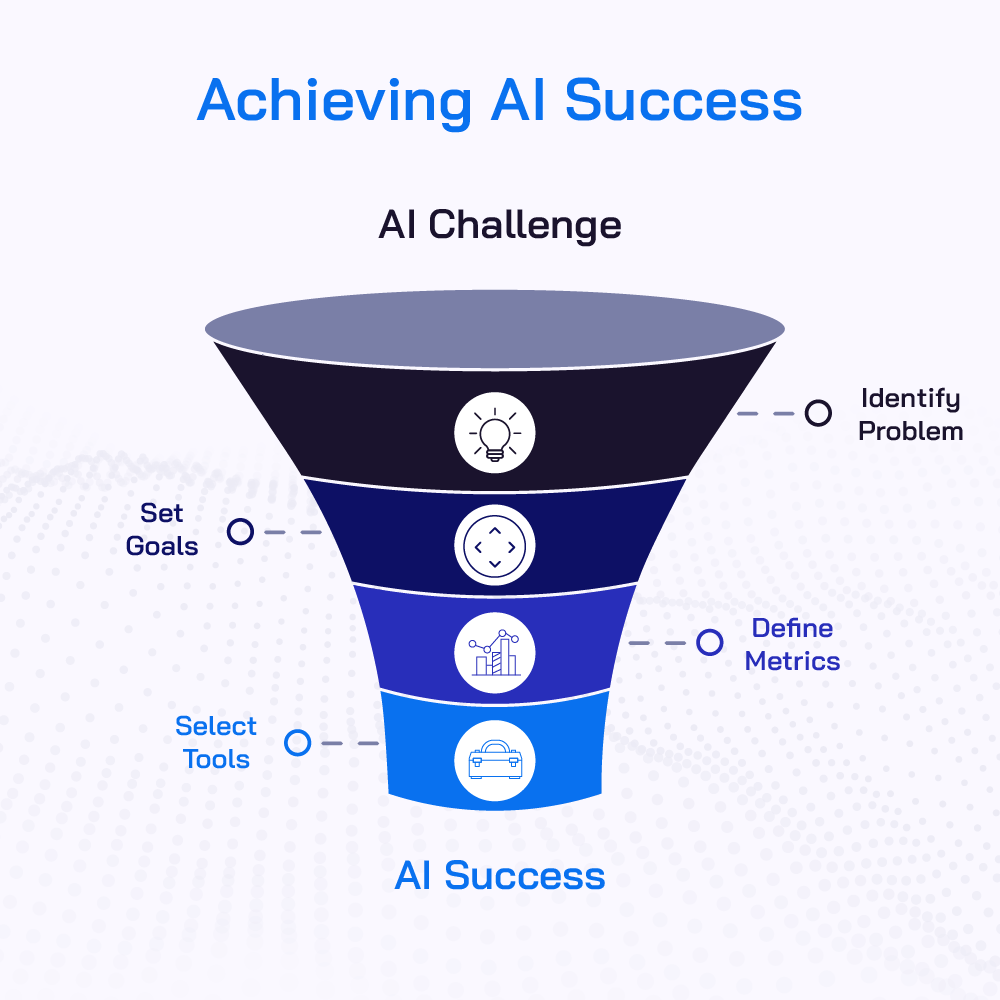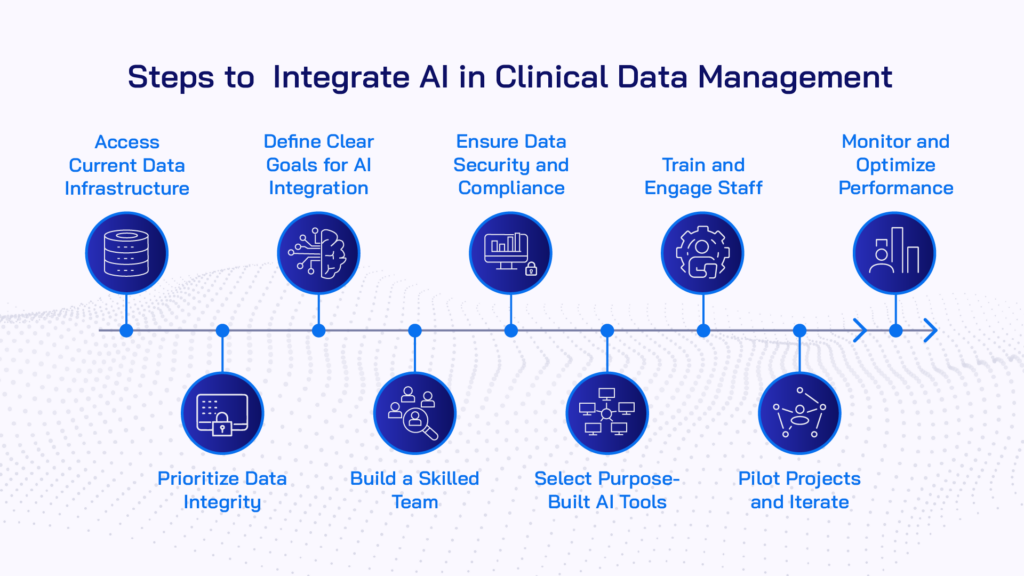A conversation with Q-Centrix Vice President, Strategic Initiatives & Regulatory Market, Bryan Wojnowski.
The Becker’s Healthcare 9th Annual Health IT + Digital Health + RCM Conference gathered over 2,000 leaders to explore healthcare’s future through digital transformation, AI, and data-driven innovation. Bryan Wojnowski, Vice President at Q-Centrix, shares key takeaways from the event, including the role of AI in addressing workforce challenges, the critical need for data integrity, and actionable steps for healthcare leaders to stay ahead in a rapidly evolving landscape.
Key Insights
- AI Will Transform Healthcare: AI streamlines workflows and addresses workforce challenges, but success requires thoughtful implementation and clinician trust.
- Data Integrity is Critical: Accurate, consistent data underpins patient safety, effective AI use, and compliance.
- Purpose-Driven AI Ensures Impact: Clear goals and metrics are essential for AI initiatives to deliver measurable results.
- Patient Safety and Quality Data Needs Improvement: Poor data quality limits insights that prevent harm and enhance care.
- Expertise Drives Digital Transformation: Skilled teams are vital for unlocking data’s full potential and driving meaningful change.
AI’s Role in a Shrinking Workforce
If there was one trend conference participants resoundingly agreed on, says Bryan Wojnowski, it was that artificial intelligence in healthcare is growing amid a significant workforce shift. For example, Intermountain Healthcare anticipates 25% of its primary care providers to retire within three years—a statistic reflective of national projections.
Bryan’s Perspective:
To counter these workforce challenges, healthcare organizations are increasingly adopting AI to streamline repetitive tasks such as scheduling, clinical transcription, and patient monitoring. At the conference, ambient AI use cases like real-time condition alerts and transcription automation were key topics, highlighting AI’s potential to alleviate staff burdens, improve morale, and enhance patient care.
However, success depends on thoughtful and transparent AI adoption. Concerns about AI replacing jobs, distrust in outputs, and risks from poorly trained models underscore the need for caution. For instance, biased diagnostic models and errors during the COVID-19 pandemic illustrate the potential pitfalls of rushed implementations.
As Anthony Weiss from Beth Israel Deaconess Medical Center aptly put it:
The vision is big, but the approach needs to be cautious and careful, we need to build trust.
At Q-Centrix, we’ve seen firsthand that effective AI integration is a long-term effort. While AI can process vast data efficiently, human oversight remains essential for nuanced decision-making and ensuring AI supports—not disrupts—care delivery.
Is your organization fostering trust and transparency as it introduces AI to clinical workflows?
Cutting Through AI Hype in Healthcare
How do you define AI for healthcare? This was one challenge repeatedly brought up during the conference’s AI sessions, Bryan recounts.
Bryan’s Perspective:
While the definition for AI may vary from one person to the next, it is important to clearly define the problem for which you are attempting to use AI to solve. AI holds massive potential to address many of healthcare’s contemporary challenges, whether it be navigating workforce shortages, controlling costs, or improving the patient experience, but without a well-defined purpose, AI initiatives risk being unfocused, ineffective, or even harmful.
Without a well-defined purpose, AI initiatives risk being unfocused, ineffective, or even harmful.
At Q-Centrix, we’ve recognized that AI is poised to help hospitals derive greater insights from the vast amounts of data they collect. Our belief is that AI elevates the role of the human rather than eliminates it. Therefore, our model keeps the human at the center of the data curation process to ensure the highest level of data integrity. In doing so, we have been able to focus our AI development on solving specific data challenges.

Another way to approach the issue is to define what success looks like for you and your organization. For example, is the goal to reduce the time it takes to schedule appointments, detect a certain disease at an earlier stage, or more quickly identify patients suitable for clinical trial? Only until you know your goals and define what success looks like can you develop or select the right AI tools for your purposes.
What are the specific problems you want AI to solve in your healthcare organization?
Patient Safety and Quality Data—An Opportunity for Transformation
At the conference, several quality leaders, including Pallavi Yadav with the University of Toledo Medical Center and Eric Leroux with Eisenhower Health in Rancho Mirage, California, explored opportunities and challenges we have with patient safety and quality data.
When it comes to data for patient safety, we are still living in the Neanderthal age.
– Pallavi Yadav, Director, Quality and Patient Safety at University of Toledo Medical
Yadav asserted that the lack of detailed and high-quality data, including inconsistent and incomplete data, continues to restrict the use of data analytics for improving quality and safety of care.
Bryan’s Perspective:
Clinical data is the most valuable asset hospitals possess today, yet data quality issues hinder our ability to unlock its power for improving patient safety and care. At Q-Centrix, we talk a lot about data integrity, which refers not just to the accuracy of data, but the accuracy, completeness, and consistency of clinical data over its entire lifecycle.
To really be able to use clinical data to prevent lapses in safety and guide clinical decision-making in real-time, the integrity of that data needs to be present at every step—it can’t wait or be checked on as an afterthought.
Achieving data integrity is a concerted effort, but once you have made the investment, then you can reliably begin connecting insights for improving patient safety and outcomes.
Are you confident in the integrity of your patient safety and quality data?
Beyond the Conference—Trends and Best Practices Not to Be Ignored
The Becker’s Healthcare 9th Annual Health IT + Digital Health + RCM Conference brought together an impressive array of experts to discuss the future of healthcare with a focus on digital technology and innovation in a way that few other meetings have. So, what should those looking to stay ahead of healthcare’s digital curve consider as we forge ahead?
Bryan’s Perspective:
Of course, considering my role at Q-Centrix, I’m biased, but I wholeheartedly believe there’s a critical need to make clinical data a priority.
Data is the common thread running through essentially every topic discussed at the conference.”
Clinical data holds immense potential for driving organizational improvements, yet it often remains siloed, unstructured, and incomplete. Until these challenges are addressed, many of the goals and innovations discussed at the conference will remain out of reach.
Data is the foundation of any successful AI initiative. Common pitfalls—such as inaccurate, outdated, or insufficient data—can derail even the most promising projects. Hospitals can start by improving their management of publicly reported quality measures, like Core Measures and electronic clinical quality measures (eCQMs). Optimizing these practices not only supports compliance but also unlocks data for broader use.
Establishing a knowledgeable team, whether internal or external, is essential for fully leveraging clinical data. Expertise in navigating its nuances is critical for advancing AI initiatives, value-based care programs, and other transformative efforts.
Given the high barriers and risks associated with AI-powered data initiatives, healthcare facilities should partner with trusted organizations with proven track records to ensure safe and effective implementation.

How can your organization prioritize clinical data management to support both AI and broader organizational goals?
Want to learn more about harnessing the power of clinical data and AI? Connect with Bryan and the Q-Centrix team to explore tailored solutions for your organization.



